Moudle10 Australia词汇短语句型精讲 课件(共64张PPT)
文档属性
| 名称 | Moudle10 Australia词汇短语句型精讲 课件(共64张PPT) | 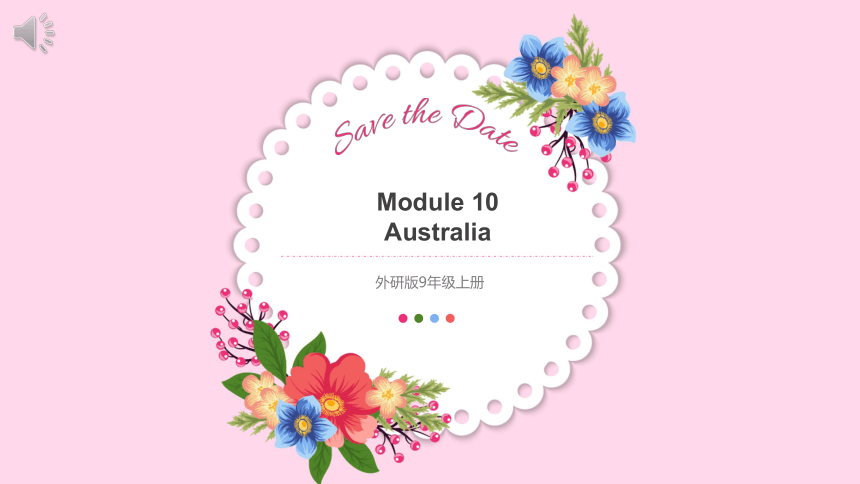 | |
| 格式 | pptx | ||
| 文件大小 | 14.9MB | ||
| 资源类型 | 教案 | ||
| 版本资源 | 外研版 | ||
| 科目 | 英语 | ||
| 更新时间 | 2021-07-21 08:09:20 | ||
图片预览

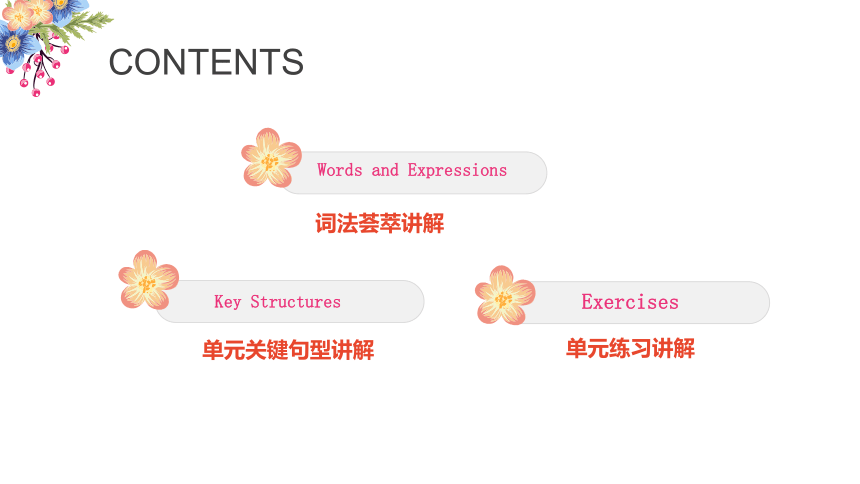
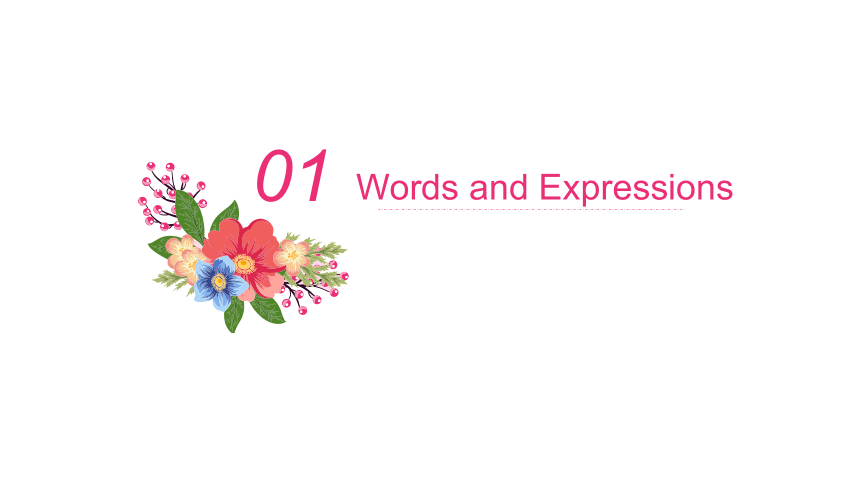
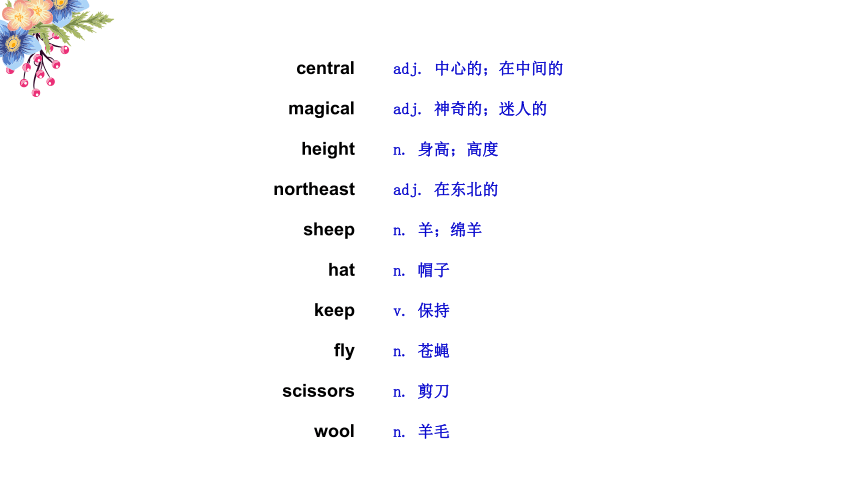

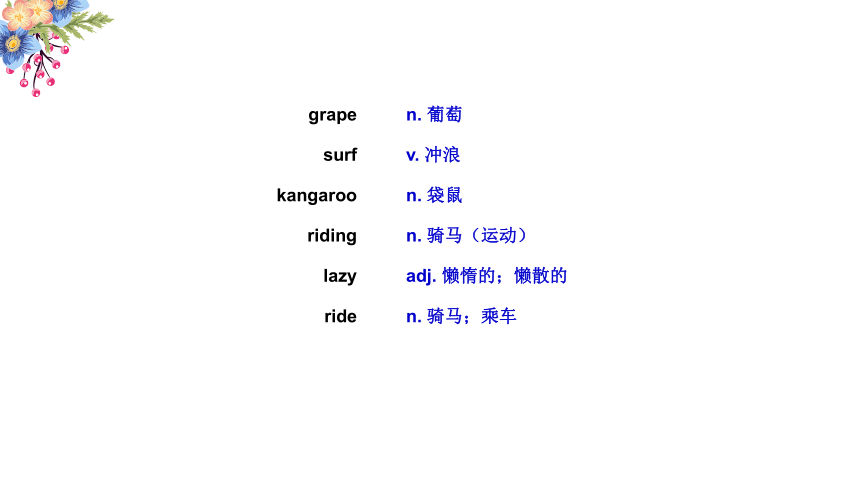
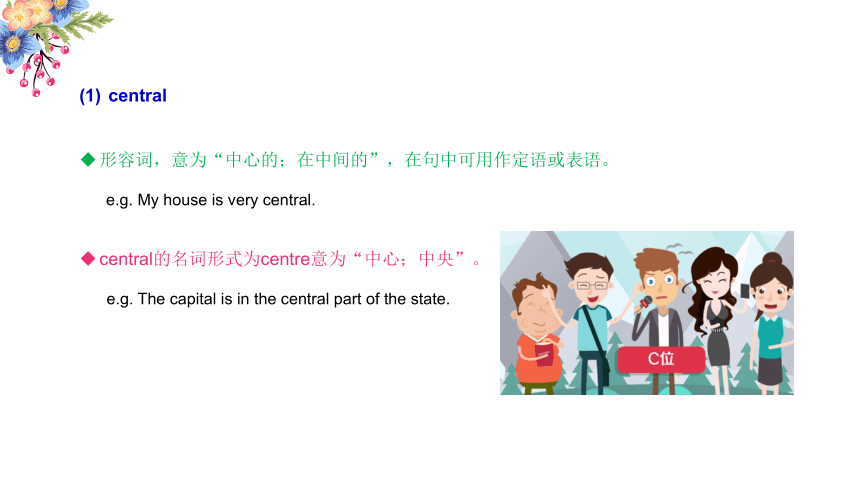
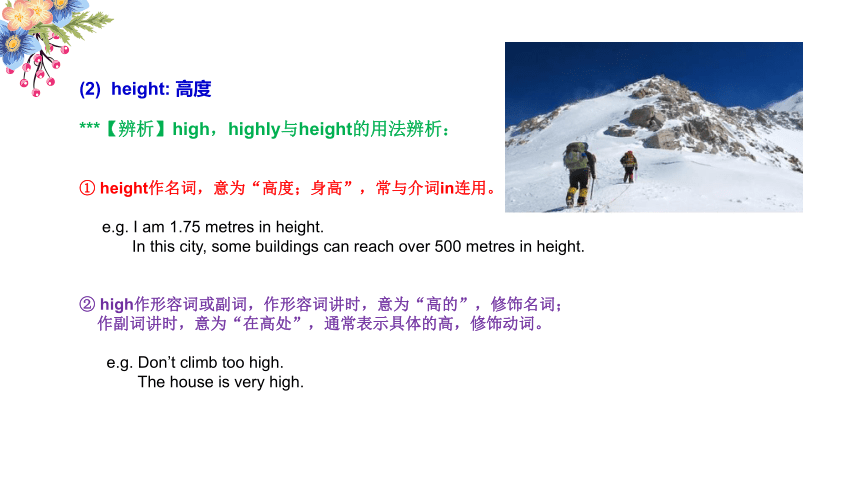
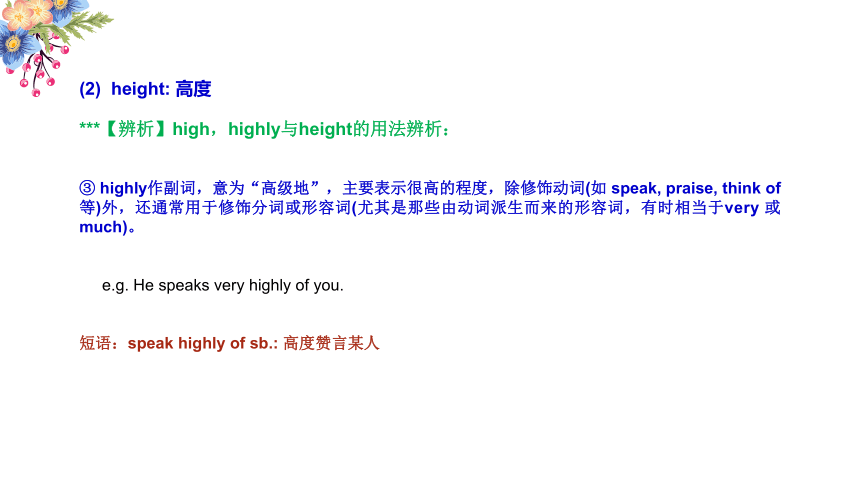
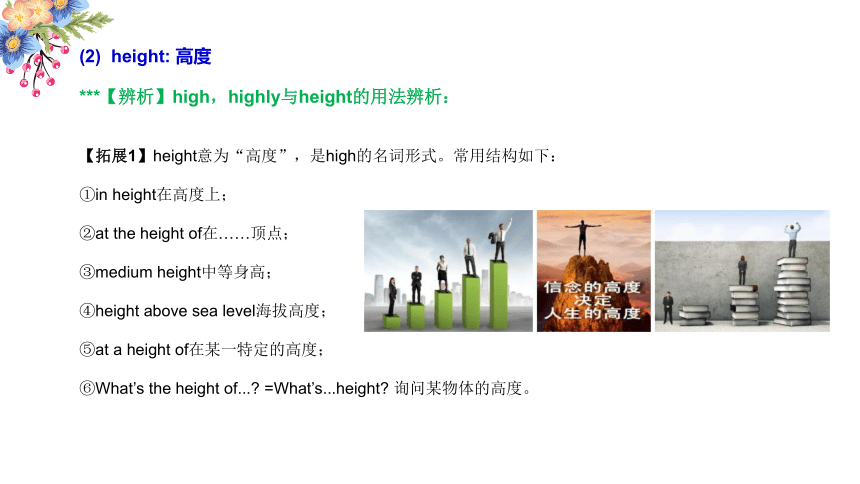
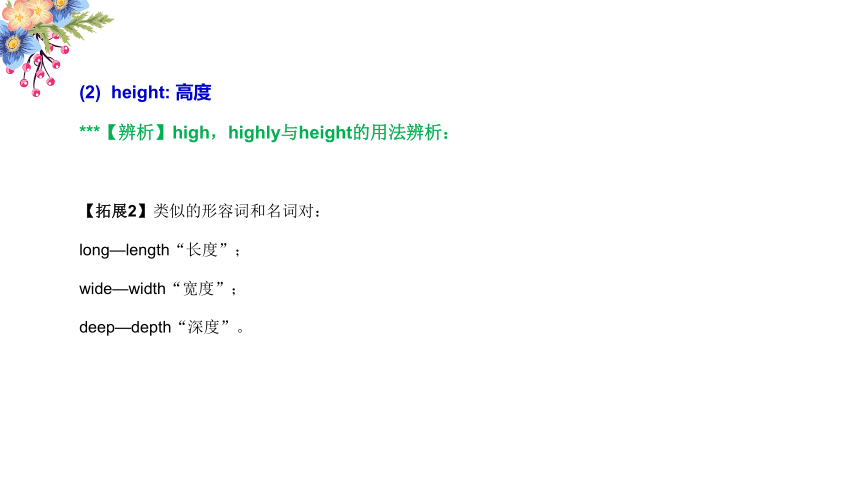
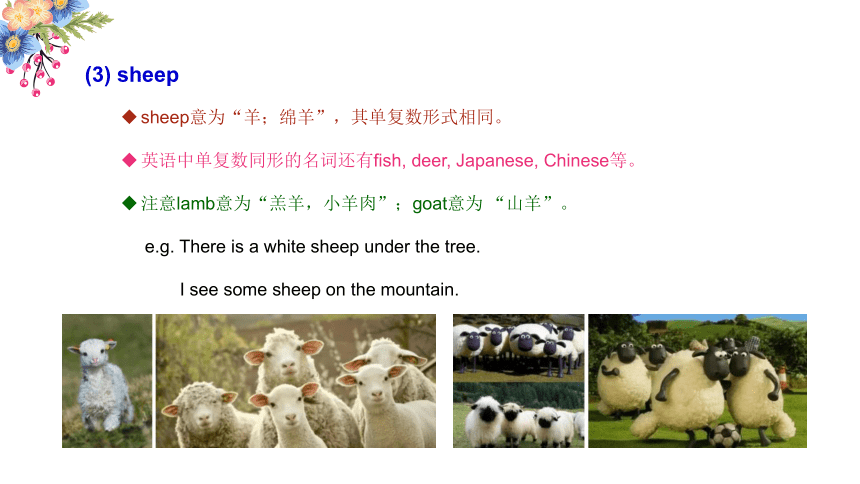
文档简介
(共64张PPT)
Module 10
Australia
外研版9年级上册
词法荟萃讲解
Words and Expressions
单元关键句型讲解
Key Structures
CONTENTS
Exercises
单元练习讲解
01
Words and Expressions
central
magical
height
northeast
sheep
hat
keep
fly
scissors
wool
adj. 中心的;在中间的
adj. 神奇的;迷人的
n. 身高;高度
adj. 在东北的
n. 羊;绵羊
n. 帽子
v. 保持
n. 苍蝇
n. 剪刀
n. 羊毛
diary
hate
ant
brush
period
spirit
relationship
relative
ham
salad
n. 日记;日记簿
v. 憎恨;讨厌
n. 蚂蚁
v. 刷
n. 阶段;时期
n. 精灵;精神
n. 亲戚
n. 亲戚
n. 火腿
n. 色拉
grape
surf
kangaroo
riding
lazy
ride
n. 葡萄
v. 冲浪
n. 袋鼠
n. 骑马(运动)
adj. 懒惰的;懒散的
n. 骑马;乘车
central
形容词,意为“中心的;在中间的”,在句中可用作定语或表语。
e.g. My house is very central.
central的名词形式为centre意为“中心;中央”。
e.g. The capital is in the central part of the state.
(2) height: 高度
***【辨析】high,highly与height的用法辨析:
① height作名词,意为“高度;身高”,常与介词in连用。
e.g. I am 1.75 metres in height.
In this city, some buildings can reach over 500 metres in height.
② high作形容词或副词,作形容词讲时,意为“高的”,修饰名词;
作副词讲时,意为“在高处”,通常表示具体的高,修饰动词。
e.g. Don’t climb too high.
The house is very high.
(2) height: 高度
***【辨析】high,highly与height的用法辨析:
③ highly作副词,意为“高级地”,主要表示很高的程度,除修饰动词(如 speak, praise, think of等)外,还通常用于修饰分词或形容词(尤其是那些由动词派生而来的形容词,有时相当于very 或much)。
e.g. He speaks very highly of you.
短语:speak highly of sb.: 高度赞言某人
(2) height: 高度
***【辨析】high,highly与height的用法辨析:
【拓展1】height意为“高度”,是high的名词形式。常用结构如下:
①in height在高度上;
②at the height of在……顶点;
③medium height中等身高;
④height above sea level海拔高度;
⑤at a height of在某一特定的高度;
⑥What’s the height of... =What’s...height 询问某物体的高度。
(2) height: 高度
***【辨析】high,highly与height的用法辨析:
【拓展2】类似的形容词和名词对:
long—length“长度”;
wide—width“宽度”;
deep—depth“深度”。
(3) sheep
sheep意为“羊;绵羊”,其单复数形式相同。
英语中单复数同形的名词还有fish, deer, Japanese, Chinese等。
注意lamb意为“羔羊,小羊肉”;goat意为 “山羊”。
e.g. There is a white sheep under the tree.
I see some sheep on the mountain.
(4) keep
keep是动词,意为“保持;继续不断”,其用法如下:
① keep (sb./sth.) doing sth.意为“使得(某人/某物)一直做某事”。keep是动词,意为“保持;使保持某种状态”。
e.g. Don’t keep your mother waiting.
I’m sorry to keep you waiting.
② keep doing sth. 意为“坚持/不断/反复/一直做某事,不间断地持续做某事”,强调状态或动作的持续,不与表示瞬间动作的动词连用,动作本身是主语发出来的。
e.g. Keep running, you will lose the weight.
We must keep learning English every day.
(4) keep
③keep...from doing sth. 意为“阻止……做某事”。
e.g. we must keep people from throwing wastes away.
④keep on doing sth. 意为“持续不断地做某事”。
e.g. He kept on working after dark.
⑤“keep sb./sth.+形容词/副词/介词短语/现在分词(作宾补)”意为“使某人/某物保持某种状态”。
e.g. Please keep your hands behind your back.
(5) scissors
意为“剪刀”,是由不可分开的两部分组成的物体名词,只有复数形式,不能与
a, an或one直接连用。
当它们做主语时,谓语动词用复数;
当它们前面有pair/type/kind时,谓语动词与pair/type/kind一致。
e.g. Those kinds of shorts are on sale.
There is a pair of scissors in the bottom drawer.
(5) scissors
【拓展】类似scissors的单词可以用以下口诀记忆:
一把剪刀(scissors)剪出了一条裤子(pants, trousers),
牛仔裤(jeans)和短裤(shorts),只能戴着眼镜(glasses)才能看清。
(6) hate
hate 作及物动词,意为“憎恨;讨厌”,其反义词为:love意为“喜爱,喜欢”。
① hate sb./sth. 意为“讨厌某人/某物”。
e.g. Jill hates Monday mornings.
I hated myself for writing that letter.
② hate doing sth. 意为“讨厌做某事”。指习惯性或经常性的动作。
e.g. Mary hated watching the football matches.
③hate to do sth. 意为“讨厌做某事”。指具体的某一次动作。
e.g. I like swimming but I hate to swim today.
(7) brush
brush作动词,意为“(用刷子) 刷”;brush作名词,意为“刷子”。
brush sth. off sth.意为“把某物从某物上刷掉/拂去”。
e.g. The horse brushed the flies off its back.
She brushed the dust off the table cloth.
(8) period
period意为“阶段,时期”,常用短语:
a period of...一段……的时期;
during different periods在不同的时期;
during the period of 在……期间;
in certain period 在某一时期;
in that period 在那个时期。
(8) period
period意为“阶段,时期”
e.g. We lived in Beijing for a period.
Childhood is a period of rapid growth.
This was the most difficult period of his life.
The work must be finished within a two-month period.
Kites had different names during different periods.
(9) spirit
spirit意为“精灵;神灵;灵魂”时,是可数名词;
spirit意为“精神;心灵”时,是不可数名词;
spirits意为“情绪;心情”,作此意思讲时必须用复数。
(9) spirit
与spirits有关的常用搭配:
be in (good / high) spirits 喜气洋洋,快活,兴高采烈;
lose one’s spirits 垂头丧气;
keep up your spirits 振作起来,打起精神。
e.g. They believe that his spirit lives on after death.
I’m always in high spirits.
He lost his spirits after hearing the news.
relationship是名词,意为“关系;联系”。
构成短语: have a close relationship with sb.意为“和某人保持亲密的关系”
e.g. She has a very close relationship with her sister.
There is a relationship between diet and cancer.
I want to trust you and have a close relationship with you.
(10) relationship
【拓展】
relationship是在名词relation“亲戚关系”后加后缀-ship构成的单词,表示的是抽象意义。
类似构成还有:
friend朋友→friendship友谊;
hard困难的→hardship困难;
citizen居民→citizenship居民权,
(10) relationship
(1) relatives意为“亲戚”。
(2) relative 的同义词为relation,两者都指根据血统或婚姻关系的远近来说,较近的亲戚
用relation,较远的亲戚用relative。
e.g. My aunt is my nearest relative.
These are the gifts to relatives/relations.
(11) relative
here we go
according to
sailing boat
keep sb./sth.away
cut sth. off sth.
keep a diary
brush sth. off sth.
at the time
be surprised at
我们这就看看
根据
帆船
(使)避开
把某物从某物上剪掉
记日记
把某物从某物上刷掉
那时,在那段时间
对…感到惊奇
the largest English-speaking country
in one’s opinion
be famous for
in the southern part of
ask sb. to do sth.
write a letter to sb.
with water on three sides
lie off
be used to do sth.
最大的说英语的国家
以……某人的观点
因……而著名
在……的南部
要求/叫某人做某事
给某人写信
三面环水
位于
被用来做某事
all over
at the moment
on the first day
take a plane tour
during different periods of the day
have a close relationship with sb.
in many ways
on the hills
in the fields
到处;遍及各处;浑身
此刻;目前;现在
在第一天;
乘飞机旅行;
在一天不同的时期;
与某人有着密切的关系;
在很多方面/用很多方法;
在山上;
在田/地里;
in the sun
in one’s own way
worry about
go horse riding
far behind
be made of
be made from
get along (with sb.)
在太阳下;
用某人自己的方式;
担心;担忧;
去骑马;
远远落后;
由……制成(物理变化);
由……制成(化学变化)
与某人相处。
according to
“根据;按照;据……所说”,主要用来表示“根据”某学说、某书刊、某文件、某人所说等或表示“按照”某法律、某规定、某惯例、某情况等。
according to后一般不接opinion, view这类词,也不接第一人称代词me, us等。
e.g. According to him, there will be a meeting next week.
They divided themselves into three groups according to their age.
cut sth. off sth. 把某物从某物剪掉
cut off 意为“切掉;剪掉;切下来;剪下来;切断(水、电)”。
该短语是“动词+副词”构成的短语。如果它的宾语是代词要放在“动词+副词”中间,
如果它的宾语是名词既可以放在“动词+副词”的中间也可以放在动词和副词的后面。
e.g. He cut off some branches from the tree.
Mrs Johnson cut her beautiful hair off.
cut sth. off sth. 把某物从某物剪掉
【拓展】与cut有关的常用搭配:
cut into把……切成;
cut down砍倒;削减;
cut up切碎;剁碎;
cut out切掉;突然停止;
cut one’s hair理发;
cut in插嘴。
at the time
at the time意为“那时;在那段时间”。相当于at that time,常与一般过去时或过去进行时连用。
e.g. At the time, I was swimming with my friends.
At the time, China did not yet have nuclear weapon.
be surprised at (doing)sth.意为“对某事感到惊奇/吃惊”,主语是人,后面可接名词、代词、
动名词形式或how, what引导的感叹句等。
e.g. I was surprised at how quickly she agreed.
We are surprised at his surprising success.
It seemed that he was very surprised at the news.
be surprised at
02
Key structures
In Tony’s opinion, Australia is famous for the Olympic Games in 2000. 在托尼看来,澳大利亚因2000年奥运会而闻名。
in one’s opinion意为“按某人的意见/观点;在/据某人看来”,其中one’s可用形容词性物主代词或名词所有格代替,常用来引出个人观点,相当于I think。
e.g. In Jim’s opinion, Mary is a lazy girl.
In my opinion, cheating in exams does great harm to our study.
In Tony’s opinion, Australia is famous for the Olympic Games in 2000. 在托尼看来,澳大利亚因2000年奥运会而闻名。
【辨析】be famous for,be famous to与be famous as的用法辨析:
① be famous for…=be known for… 意为“因……而出名”,后接闻名/著名的原因。
e.g. Jin Yong is famous for his books.
China is famous for the Great Wall.
② be famous to… 意为“为某人所熟知”,后接某人。
e.g. Jin Yong is famous to young people.
The singer is famous to lots of old people.
In Tony’s opinion, Australia is famous for the Olympic Games in 2000. 在托尼看来,澳大利亚因2000年奥运会而闻名。
【辨析】be famous for,be famous to与be famous as的用法辨析:
③be famous as… 意为“作为……而出名”,后接表示身份、职位或称号等的名词。
e.g. Lu Xun is famous as a writer.
Yang Liwei is famous as China’s first astronaut.
Does it lie off the northeast coast of Australia 它是位于澳大利亚东北海岸吗?
【辨析】lie off,lie to,lie in与lie on的用法辨析:
① lie off意为“位于……(某范围之外)”。
e.g. Many islands lie off China’s east coast.
It lies off the northeast coast of Australia.
② lie to意为“位于……(某范围之外)”。
e.g. Japan lies to the east of China.
Beijing lies to the east of Urumqi.
Does it lie off the northeast coast of Australia 它是位于澳大利亚东北海岸吗?
【辨析】lie off,lie to,lie in与lie on的用法辨析:
③ lie in意为“位于……(某范围之内)”。
e.g. Guangzhou lies in the south of China.
Changchun lies in the northeast of China.
④ lie on意为“位于……(与之相邻/接壤)”。
e.g. India lies on the southwest of China.
Hubei Province lies on the north of Hu’nan Province.
The scissors that they’re holding are used to cut the wool off the sheep. 他们拿着的剪刀是用来剪羊毛的。
【辨析】be used to do sth.,be/get used to+doing sth./sth.与used to do sth.的用法辨析:
① be used to do sth.=be used for doing sth.意为“被用来做某事(被动语态)”。
e.g. It can also be used to eat.
MP5 can be used for listening to music and seeing the films.
② be/get used to+doing sth./sth. 意为“习惯于做某事”,to是介词,后一般接名词、代词
或动名词。
e.g. Now he is used to getting up early.
You’ll soon get/be used to hard work.
The scissors that they’re holding are used to cut the wool off the sheep. 他们拿着的剪刀是用来剪羊毛的。
【辨析】be used to do sth.,be/get used to+doing sth./sth.与used to do sth.的用法辨析:
③ used to do sth.意为“过去常常做某事”,表示过去习惯性、经常性的动作或状态,暗示现在
不做了,to为不定式符号,后跟动词原形,used没有人称和时态的变化。
e.g. He used to get up early. 过去他经常早起.(意味着如今他不再早起了.)
I used to drop in at the bookstore on my way home.
That’s why they speak English. 那就是他们为什么说英语的原因。
【辨析】That’s why…与That’s because…的用法辨析:
①That’s why(+结果). 意为“那就是……的原因;那就是为什么……”,常用于句首,
why引导表语从句,表示结果,that指代前面提到的内容,表示原因,即“先因后果”。
类似的结构有:
That’s because…意为“那是因为……”;
The reason why…is that…意为“……的理由是……”。
e.g. That’s why they didn’t like the music.
It is snowing heavily. That’s why he is late.
That’s why they speak English. 那就是他们为什么说英语的原因。
【辨析】That’s why…与That’s because…的用法辨析:
②That’s because(+原因). 意为“那是因为……”,常用于句首,because在此引导的是
表语从句,后接表示原因的句子,that指代前面提到的结果,即“先果后因”。
e.g. You can’t join the army. That’s because you are not old enough.
She can’t understand this passage. That’s because she is only a child.
At the moment, we are staying near Ayers Rock. 现在,我们在艾尔斯岩附近。
【辨析】at the moment与at that moment的用法辨析:
① at the moment意为“此刻,现在,目前”,相当于now,其中的the也可换为this,常常与一般现在时或现在进行时连用。
e.g. I am chatting with my friends at the moment.
②at that moment意为“在那时”,常常与一般过去时连用。
e.g. He was very busy at that moment.
At the moment, we are staying near Ayers Rock. 现在,我们在艾尔斯岩附近。
【拓展】与moment有关的常用搭配:
in a moment立刻;马上(用于一般将来时态);
at any moment随时(有可能的情况);
for a moment一会儿(表示一段时间);
at that moment在那时(用于过去时态);
a moment ago刚才(用于一般过去时);
hang on a moment请稍等(电话用语)。
On the first day, we took a plane tour over the rock, and I was surprised at how big it was: 3.6 kilometres long and 348 metres high! 在第一天,我们乘飞机参观了艾尔斯岩,我对它如此之大感到惊奇:3.6千米长,348米高。
surprised是形容词,意为“人感到惊讶”,主语是人。其用法如下:
① be surprised at (doing)sth.意为“对某事感到惊奇/吃惊”
e.g. I was surprised at how quickly she agreed.
② be surprised to do sth.意为“惊讶地做某事”,主语是人。
e.g. I am surprised to see you.
On the first day, we took a plane tour over the rock, and I was surprised at how big it was: 3.6 kilometres long and 348 metres high! 在第一天,我们乘飞机参观了艾尔斯岩,我对它如此之大感到惊奇:3.6千米长,348米高。
surprised是形容词,意为“人感到惊讶”,主语是人。其用法如下:
③ be surprised+that从句,意为“惊讶地做某事”,主语是人。
e.g. I’m surprised that he didn’t pass the exam.
I’m surprised that he should have been so foolish.
On the first day, we took a plane tour over the rock, and I was surprised at how big it was: 3.6 kilometres long and 348 metres high! 在第一天,我们乘飞机参观了艾尔斯岩,我对它如此之大感到惊奇:3.6千米长,348米高。
【拓展】
① in surprise意为“吃惊地”,为“介词+名词”结构,在句中作状语。
② to one’s surprise意为“让某人吃惊的是”,常位于句首,作状语,表示行为的结果。
e.g. John turned round and looked at him in surprise.
To her surprise, she failed in the examination.
The Australians have a close relationship with the British. 澳大利亚人与英国人有紧密的关系。
have a close relationship with sb.意为“和某人保持亲密的关系”,
relationship是名词,意为“关系;联系”。
e.g. She has a very close relationship with her sister.
There is a relationship between diet and cancer.
I want to trust you and have a close relationship with you.
Although it is December, it is summer over here. 尽管现在是12月,但这是是夏季。
1) although 是连词,意为“然而,尽管,虽然”,与though同义,引导让步状语从句。
2) although /though不能与but和however同时出现在一个句子中,但可以与yet,still连用。
3) although /though引导的让步状语从句可以放在主句之前,也可以放在主句之后。
e.g. Although Jim was busy, he still helped others.
He is still happy, although/though he is not rich.
Although he is young, (yet) he is quite experienced.
The horse that I rode was lazy, so I was left far behind the others. 我骑的马很懒,因此我远远落后于别人。
far behind是固定短语,意为“远远落后,相差很远”。
e.g. He’s fallen far behind in his work.
The country is far behind its neighbours.
Salad is made of cold vegetables that you do not need to cook. 色拉是由不需要烧煮的凉蔬菜制成的。Ham is made from pork. 火腿是由猪肉制成的。
【辨析】be made of 与be made from的用法辨析
① be made of原为be made out of常被省略,意为“由……制成”,表示制成成品后,仍可看出原材料是什么,成品保留了原材料的质和形状,制作过程仅发生物理变化,没发生本质变化。
e.g. The cloth is made of cotton.
The desks and chairs are made of wood.
②be made from意为“由……制成”,表示制成的东西完全失去原材料的外形或特征,或原材料在制作过程中发生化学变化,制成品已无法辨认原材料是什么。
e.g. Gas is made from coal.
Paper is made from wood.?
It is a great place to visit and to spend some time at. 它是一个游玩和消遣的好地方。
“It is+名词/名词短语+to do sth.”为固定句型,常用来表示自己对某事物的看法或向对方提出建议。
其中it是形式主语,真正的主语是动词不定式短语“to do sth.”。
e.g. It’s your turn to answer my questions.
It’s a good habit to wash hands before meals.
poor you用于口语中,意为“可怜的你;难为你了”,表示同情、怜惜等。
e.g. Oh, poor you! Let me bring you some medicine. You’ll feel better later after taking it.
【拓展】poor man用于口语中,表示“可怜的人”。
e.g. Poor man, it was not his fault.
Poor you. 难为你了。
get along (with sb.)意为“与某人相处”,相当于get on with sb.,with前可加well/badly,表示相处地好/不好。
注意:get along with sth.意为“某事进展”。
e.g. She’s never got along with her sister.
They get along well with each other.
How are you getting along with your English
She has become a symbol of how different cultures in Australia can get along. 她成了在澳大利亚不同的文化可以和谐共存的象征。
03
Exercise
1. —May I use your digital camera to take a photo
—________________.
A. It doesn’t matter B. Sure! Here it is. C. You’re welcome. D. Sorry to hear that.
2. Most of my classmates prefer loud music _______they can dance to.
A. that B. who C. whose D. where
3. _______ eat grass, so they are green.
A. Tigers B. A sheep C. Sheep D. Ships
4. I’m looking for the pen _______ I lost yesterday.
A. that B. who C. what D. this
5. —Everybody ______ a chance to talk with Liu Xiang next week. —Really That’s good news.
A. was given B. is going to give C. will be given D. gives
6. Yuan Longping is a scientist ______ is famous for the development of rice.
A. that B. whom C. what D. which
7. The little boy ate a big meal he said he wasn't hungry.
A. though B. if C. because D. as
8. “Can I ______ your camera ” “Sure, here you are.”
A. borrowed B. lend C. lent D. borrow
9. Seeing sharks on the Great Barrier Reef is ______.
A. amazed B. amaze C. amazing D. amazes
10. I hope to have a house ____ a kitchen so that I can save money by cooking food by myself.
A. have B. has C. without D. with
11.-What’s that
-It is a rock band ________ Ayers Rock, in central Australia.
A. called B. call C. calling D. to call
12. They kept _________ for him in front of the school.
A. wait B. waiting C. to wait D. waits
13. This is the school _______ we visited last year.
A. that B. where C. who D. whose
14. Bondi Beach is one of ________ that I’ve ever seen in Australia.
A. most beautiful beach B. the most beautiful beaches
C. the most beautiful beach D. most beautiful beaches
15. Jack’s teacher asked him ________ off the lights after class.
A. turning B. turned C. to turn D. turn
1. —May I use your digital camera to take a photo
—________________.
A. It doesn’t matter B. Sure! Here it is. C. You’re welcome. D. Sorry to hear that.
2. Most of my classmates prefer loud music _______they can dance to.
A. that B. who C. whose D. where
3. _______ eat grass, so they are green.
A. Tigers B. A sheep C. Sheep D. Ships
4. I’m looking for the pen _______ I lost yesterday.
A. that B. who C. what D. this
5. —Everybody ______ a chance to talk with Liu Xiang next week. —Really That’s good news.
A. was given B. is going to give C. will be given D. gives
B
A
C
A
C
6. Yuan Longping is a scientist ______ is famous for the development of rice.
A. that B. whom C. what D. which
7. The little boy ate a big meal he said he wasn't hungry.
A. though B. if C. because D. as
8. “Can I ______ your camera ” “Sure, here you are.”
A. borrowed B. lend C. lent D. borrow
9. Seeing sharks on the Great Barrier Reef is ______.
A. amazed B. amaze C. amazing D. amazes
10. I hope to have a house ____ a kitchen so that I can save money by cooking food by myself.
A. have B. has C. without D. with
A
A
A
C
D
11.-What’s that
-It is a rock band ________ Ayers Rock, in central Australia.
A. called B. call C. calling D. to call
12. They kept _________ for him in front of the school.
A. wait B. waiting C. to wait D. waits
13. This is the school _______ we visited last year.
A. that B. where C. who D. whose
14. Bondi Beach is one of ________ that I’ve ever seen in Australia.
A. most beautiful beach B. the most beautiful beaches
C. the most beautiful beach D. most beautiful beaches
15. Jack’s teacher asked him ________ off the lights after class.
A. turning B. turned C. to turn D. turn
A
B
A
B
C
感谢您的观看
Module 10
Australia
外研版9年级上册
词法荟萃讲解
Words and Expressions
单元关键句型讲解
Key Structures
CONTENTS
Exercises
单元练习讲解
01
Words and Expressions
central
magical
height
northeast
sheep
hat
keep
fly
scissors
wool
adj. 中心的;在中间的
adj. 神奇的;迷人的
n. 身高;高度
adj. 在东北的
n. 羊;绵羊
n. 帽子
v. 保持
n. 苍蝇
n. 剪刀
n. 羊毛
diary
hate
ant
brush
period
spirit
relationship
relative
ham
salad
n. 日记;日记簿
v. 憎恨;讨厌
n. 蚂蚁
v. 刷
n. 阶段;时期
n. 精灵;精神
n. 亲戚
n. 亲戚
n. 火腿
n. 色拉
grape
surf
kangaroo
riding
lazy
ride
n. 葡萄
v. 冲浪
n. 袋鼠
n. 骑马(运动)
adj. 懒惰的;懒散的
n. 骑马;乘车
central
形容词,意为“中心的;在中间的”,在句中可用作定语或表语。
e.g. My house is very central.
central的名词形式为centre意为“中心;中央”。
e.g. The capital is in the central part of the state.
(2) height: 高度
***【辨析】high,highly与height的用法辨析:
① height作名词,意为“高度;身高”,常与介词in连用。
e.g. I am 1.75 metres in height.
In this city, some buildings can reach over 500 metres in height.
② high作形容词或副词,作形容词讲时,意为“高的”,修饰名词;
作副词讲时,意为“在高处”,通常表示具体的高,修饰动词。
e.g. Don’t climb too high.
The house is very high.
(2) height: 高度
***【辨析】high,highly与height的用法辨析:
③ highly作副词,意为“高级地”,主要表示很高的程度,除修饰动词(如 speak, praise, think of等)外,还通常用于修饰分词或形容词(尤其是那些由动词派生而来的形容词,有时相当于very 或much)。
e.g. He speaks very highly of you.
短语:speak highly of sb.: 高度赞言某人
(2) height: 高度
***【辨析】high,highly与height的用法辨析:
【拓展1】height意为“高度”,是high的名词形式。常用结构如下:
①in height在高度上;
②at the height of在……顶点;
③medium height中等身高;
④height above sea level海拔高度;
⑤at a height of在某一特定的高度;
⑥What’s the height of... =What’s...height 询问某物体的高度。
(2) height: 高度
***【辨析】high,highly与height的用法辨析:
【拓展2】类似的形容词和名词对:
long—length“长度”;
wide—width“宽度”;
deep—depth“深度”。
(3) sheep
sheep意为“羊;绵羊”,其单复数形式相同。
英语中单复数同形的名词还有fish, deer, Japanese, Chinese等。
注意lamb意为“羔羊,小羊肉”;goat意为 “山羊”。
e.g. There is a white sheep under the tree.
I see some sheep on the mountain.
(4) keep
keep是动词,意为“保持;继续不断”,其用法如下:
① keep (sb./sth.) doing sth.意为“使得(某人/某物)一直做某事”。keep是动词,意为“保持;使保持某种状态”。
e.g. Don’t keep your mother waiting.
I’m sorry to keep you waiting.
② keep doing sth. 意为“坚持/不断/反复/一直做某事,不间断地持续做某事”,强调状态或动作的持续,不与表示瞬间动作的动词连用,动作本身是主语发出来的。
e.g. Keep running, you will lose the weight.
We must keep learning English every day.
(4) keep
③keep...from doing sth. 意为“阻止……做某事”。
e.g. we must keep people from throwing wastes away.
④keep on doing sth. 意为“持续不断地做某事”。
e.g. He kept on working after dark.
⑤“keep sb./sth.+形容词/副词/介词短语/现在分词(作宾补)”意为“使某人/某物保持某种状态”。
e.g. Please keep your hands behind your back.
(5) scissors
意为“剪刀”,是由不可分开的两部分组成的物体名词,只有复数形式,不能与
a, an或one直接连用。
当它们做主语时,谓语动词用复数;
当它们前面有pair/type/kind时,谓语动词与pair/type/kind一致。
e.g. Those kinds of shorts are on sale.
There is a pair of scissors in the bottom drawer.
(5) scissors
【拓展】类似scissors的单词可以用以下口诀记忆:
一把剪刀(scissors)剪出了一条裤子(pants, trousers),
牛仔裤(jeans)和短裤(shorts),只能戴着眼镜(glasses)才能看清。
(6) hate
hate 作及物动词,意为“憎恨;讨厌”,其反义词为:love意为“喜爱,喜欢”。
① hate sb./sth. 意为“讨厌某人/某物”。
e.g. Jill hates Monday mornings.
I hated myself for writing that letter.
② hate doing sth. 意为“讨厌做某事”。指习惯性或经常性的动作。
e.g. Mary hated watching the football matches.
③hate to do sth. 意为“讨厌做某事”。指具体的某一次动作。
e.g. I like swimming but I hate to swim today.
(7) brush
brush作动词,意为“(用刷子) 刷”;brush作名词,意为“刷子”。
brush sth. off sth.意为“把某物从某物上刷掉/拂去”。
e.g. The horse brushed the flies off its back.
She brushed the dust off the table cloth.
(8) period
period意为“阶段,时期”,常用短语:
a period of...一段……的时期;
during different periods在不同的时期;
during the period of 在……期间;
in certain period 在某一时期;
in that period 在那个时期。
(8) period
period意为“阶段,时期”
e.g. We lived in Beijing for a period.
Childhood is a period of rapid growth.
This was the most difficult period of his life.
The work must be finished within a two-month period.
Kites had different names during different periods.
(9) spirit
spirit意为“精灵;神灵;灵魂”时,是可数名词;
spirit意为“精神;心灵”时,是不可数名词;
spirits意为“情绪;心情”,作此意思讲时必须用复数。
(9) spirit
与spirits有关的常用搭配:
be in (good / high) spirits 喜气洋洋,快活,兴高采烈;
lose one’s spirits 垂头丧气;
keep up your spirits 振作起来,打起精神。
e.g. They believe that his spirit lives on after death.
I’m always in high spirits.
He lost his spirits after hearing the news.
relationship是名词,意为“关系;联系”。
构成短语: have a close relationship with sb.意为“和某人保持亲密的关系”
e.g. She has a very close relationship with her sister.
There is a relationship between diet and cancer.
I want to trust you and have a close relationship with you.
(10) relationship
【拓展】
relationship是在名词relation“亲戚关系”后加后缀-ship构成的单词,表示的是抽象意义。
类似构成还有:
friend朋友→friendship友谊;
hard困难的→hardship困难;
citizen居民→citizenship居民权,
(10) relationship
(1) relatives意为“亲戚”。
(2) relative 的同义词为relation,两者都指根据血统或婚姻关系的远近来说,较近的亲戚
用relation,较远的亲戚用relative。
e.g. My aunt is my nearest relative.
These are the gifts to relatives/relations.
(11) relative
here we go
according to
sailing boat
keep sb./sth.away
cut sth. off sth.
keep a diary
brush sth. off sth.
at the time
be surprised at
我们这就看看
根据
帆船
(使)避开
把某物从某物上剪掉
记日记
把某物从某物上刷掉
那时,在那段时间
对…感到惊奇
the largest English-speaking country
in one’s opinion
be famous for
in the southern part of
ask sb. to do sth.
write a letter to sb.
with water on three sides
lie off
be used to do sth.
最大的说英语的国家
以……某人的观点
因……而著名
在……的南部
要求/叫某人做某事
给某人写信
三面环水
位于
被用来做某事
all over
at the moment
on the first day
take a plane tour
during different periods of the day
have a close relationship with sb.
in many ways
on the hills
in the fields
到处;遍及各处;浑身
此刻;目前;现在
在第一天;
乘飞机旅行;
在一天不同的时期;
与某人有着密切的关系;
在很多方面/用很多方法;
在山上;
在田/地里;
in the sun
in one’s own way
worry about
go horse riding
far behind
be made of
be made from
get along (with sb.)
在太阳下;
用某人自己的方式;
担心;担忧;
去骑马;
远远落后;
由……制成(物理变化);
由……制成(化学变化)
与某人相处。
according to
“根据;按照;据……所说”,主要用来表示“根据”某学说、某书刊、某文件、某人所说等或表示“按照”某法律、某规定、某惯例、某情况等。
according to后一般不接opinion, view这类词,也不接第一人称代词me, us等。
e.g. According to him, there will be a meeting next week.
They divided themselves into three groups according to their age.
cut sth. off sth. 把某物从某物剪掉
cut off 意为“切掉;剪掉;切下来;剪下来;切断(水、电)”。
该短语是“动词+副词”构成的短语。如果它的宾语是代词要放在“动词+副词”中间,
如果它的宾语是名词既可以放在“动词+副词”的中间也可以放在动词和副词的后面。
e.g. He cut off some branches from the tree.
Mrs Johnson cut her beautiful hair off.
cut sth. off sth. 把某物从某物剪掉
【拓展】与cut有关的常用搭配:
cut into把……切成;
cut down砍倒;削减;
cut up切碎;剁碎;
cut out切掉;突然停止;
cut one’s hair理发;
cut in插嘴。
at the time
at the time意为“那时;在那段时间”。相当于at that time,常与一般过去时或过去进行时连用。
e.g. At the time, I was swimming with my friends.
At the time, China did not yet have nuclear weapon.
be surprised at (doing)sth.意为“对某事感到惊奇/吃惊”,主语是人,后面可接名词、代词、
动名词形式或how, what引导的感叹句等。
e.g. I was surprised at how quickly she agreed.
We are surprised at his surprising success.
It seemed that he was very surprised at the news.
be surprised at
02
Key structures
In Tony’s opinion, Australia is famous for the Olympic Games in 2000. 在托尼看来,澳大利亚因2000年奥运会而闻名。
in one’s opinion意为“按某人的意见/观点;在/据某人看来”,其中one’s可用形容词性物主代词或名词所有格代替,常用来引出个人观点,相当于I think。
e.g. In Jim’s opinion, Mary is a lazy girl.
In my opinion, cheating in exams does great harm to our study.
In Tony’s opinion, Australia is famous for the Olympic Games in 2000. 在托尼看来,澳大利亚因2000年奥运会而闻名。
【辨析】be famous for,be famous to与be famous as的用法辨析:
① be famous for…=be known for… 意为“因……而出名”,后接闻名/著名的原因。
e.g. Jin Yong is famous for his books.
China is famous for the Great Wall.
② be famous to… 意为“为某人所熟知”,后接某人。
e.g. Jin Yong is famous to young people.
The singer is famous to lots of old people.
In Tony’s opinion, Australia is famous for the Olympic Games in 2000. 在托尼看来,澳大利亚因2000年奥运会而闻名。
【辨析】be famous for,be famous to与be famous as的用法辨析:
③be famous as… 意为“作为……而出名”,后接表示身份、职位或称号等的名词。
e.g. Lu Xun is famous as a writer.
Yang Liwei is famous as China’s first astronaut.
Does it lie off the northeast coast of Australia 它是位于澳大利亚东北海岸吗?
【辨析】lie off,lie to,lie in与lie on的用法辨析:
① lie off意为“位于……(某范围之外)”。
e.g. Many islands lie off China’s east coast.
It lies off the northeast coast of Australia.
② lie to意为“位于……(某范围之外)”。
e.g. Japan lies to the east of China.
Beijing lies to the east of Urumqi.
Does it lie off the northeast coast of Australia 它是位于澳大利亚东北海岸吗?
【辨析】lie off,lie to,lie in与lie on的用法辨析:
③ lie in意为“位于……(某范围之内)”。
e.g. Guangzhou lies in the south of China.
Changchun lies in the northeast of China.
④ lie on意为“位于……(与之相邻/接壤)”。
e.g. India lies on the southwest of China.
Hubei Province lies on the north of Hu’nan Province.
The scissors that they’re holding are used to cut the wool off the sheep. 他们拿着的剪刀是用来剪羊毛的。
【辨析】be used to do sth.,be/get used to+doing sth./sth.与used to do sth.的用法辨析:
① be used to do sth.=be used for doing sth.意为“被用来做某事(被动语态)”。
e.g. It can also be used to eat.
MP5 can be used for listening to music and seeing the films.
② be/get used to+doing sth./sth. 意为“习惯于做某事”,to是介词,后一般接名词、代词
或动名词。
e.g. Now he is used to getting up early.
You’ll soon get/be used to hard work.
The scissors that they’re holding are used to cut the wool off the sheep. 他们拿着的剪刀是用来剪羊毛的。
【辨析】be used to do sth.,be/get used to+doing sth./sth.与used to do sth.的用法辨析:
③ used to do sth.意为“过去常常做某事”,表示过去习惯性、经常性的动作或状态,暗示现在
不做了,to为不定式符号,后跟动词原形,used没有人称和时态的变化。
e.g. He used to get up early. 过去他经常早起.(意味着如今他不再早起了.)
I used to drop in at the bookstore on my way home.
That’s why they speak English. 那就是他们为什么说英语的原因。
【辨析】That’s why…与That’s because…的用法辨析:
①That’s why(+结果). 意为“那就是……的原因;那就是为什么……”,常用于句首,
why引导表语从句,表示结果,that指代前面提到的内容,表示原因,即“先因后果”。
类似的结构有:
That’s because…意为“那是因为……”;
The reason why…is that…意为“……的理由是……”。
e.g. That’s why they didn’t like the music.
It is snowing heavily. That’s why he is late.
That’s why they speak English. 那就是他们为什么说英语的原因。
【辨析】That’s why…与That’s because…的用法辨析:
②That’s because(+原因). 意为“那是因为……”,常用于句首,because在此引导的是
表语从句,后接表示原因的句子,that指代前面提到的结果,即“先果后因”。
e.g. You can’t join the army. That’s because you are not old enough.
She can’t understand this passage. That’s because she is only a child.
At the moment, we are staying near Ayers Rock. 现在,我们在艾尔斯岩附近。
【辨析】at the moment与at that moment的用法辨析:
① at the moment意为“此刻,现在,目前”,相当于now,其中的the也可换为this,常常与一般现在时或现在进行时连用。
e.g. I am chatting with my friends at the moment.
②at that moment意为“在那时”,常常与一般过去时连用。
e.g. He was very busy at that moment.
At the moment, we are staying near Ayers Rock. 现在,我们在艾尔斯岩附近。
【拓展】与moment有关的常用搭配:
in a moment立刻;马上(用于一般将来时态);
at any moment随时(有可能的情况);
for a moment一会儿(表示一段时间);
at that moment在那时(用于过去时态);
a moment ago刚才(用于一般过去时);
hang on a moment请稍等(电话用语)。
On the first day, we took a plane tour over the rock, and I was surprised at how big it was: 3.6 kilometres long and 348 metres high! 在第一天,我们乘飞机参观了艾尔斯岩,我对它如此之大感到惊奇:3.6千米长,348米高。
surprised是形容词,意为“人感到惊讶”,主语是人。其用法如下:
① be surprised at (doing)sth.意为“对某事感到惊奇/吃惊”
e.g. I was surprised at how quickly she agreed.
② be surprised to do sth.意为“惊讶地做某事”,主语是人。
e.g. I am surprised to see you.
On the first day, we took a plane tour over the rock, and I was surprised at how big it was: 3.6 kilometres long and 348 metres high! 在第一天,我们乘飞机参观了艾尔斯岩,我对它如此之大感到惊奇:3.6千米长,348米高。
surprised是形容词,意为“人感到惊讶”,主语是人。其用法如下:
③ be surprised+that从句,意为“惊讶地做某事”,主语是人。
e.g. I’m surprised that he didn’t pass the exam.
I’m surprised that he should have been so foolish.
On the first day, we took a plane tour over the rock, and I was surprised at how big it was: 3.6 kilometres long and 348 metres high! 在第一天,我们乘飞机参观了艾尔斯岩,我对它如此之大感到惊奇:3.6千米长,348米高。
【拓展】
① in surprise意为“吃惊地”,为“介词+名词”结构,在句中作状语。
② to one’s surprise意为“让某人吃惊的是”,常位于句首,作状语,表示行为的结果。
e.g. John turned round and looked at him in surprise.
To her surprise, she failed in the examination.
The Australians have a close relationship with the British. 澳大利亚人与英国人有紧密的关系。
have a close relationship with sb.意为“和某人保持亲密的关系”,
relationship是名词,意为“关系;联系”。
e.g. She has a very close relationship with her sister.
There is a relationship between diet and cancer.
I want to trust you and have a close relationship with you.
Although it is December, it is summer over here. 尽管现在是12月,但这是是夏季。
1) although 是连词,意为“然而,尽管,虽然”,与though同义,引导让步状语从句。
2) although /though不能与but和however同时出现在一个句子中,但可以与yet,still连用。
3) although /though引导的让步状语从句可以放在主句之前,也可以放在主句之后。
e.g. Although Jim was busy, he still helped others.
He is still happy, although/though he is not rich.
Although he is young, (yet) he is quite experienced.
The horse that I rode was lazy, so I was left far behind the others. 我骑的马很懒,因此我远远落后于别人。
far behind是固定短语,意为“远远落后,相差很远”。
e.g. He’s fallen far behind in his work.
The country is far behind its neighbours.
Salad is made of cold vegetables that you do not need to cook. 色拉是由不需要烧煮的凉蔬菜制成的。Ham is made from pork. 火腿是由猪肉制成的。
【辨析】be made of 与be made from的用法辨析
① be made of原为be made out of常被省略,意为“由……制成”,表示制成成品后,仍可看出原材料是什么,成品保留了原材料的质和形状,制作过程仅发生物理变化,没发生本质变化。
e.g. The cloth is made of cotton.
The desks and chairs are made of wood.
②be made from意为“由……制成”,表示制成的东西完全失去原材料的外形或特征,或原材料在制作过程中发生化学变化,制成品已无法辨认原材料是什么。
e.g. Gas is made from coal.
Paper is made from wood.?
It is a great place to visit and to spend some time at. 它是一个游玩和消遣的好地方。
“It is+名词/名词短语+to do sth.”为固定句型,常用来表示自己对某事物的看法或向对方提出建议。
其中it是形式主语,真正的主语是动词不定式短语“to do sth.”。
e.g. It’s your turn to answer my questions.
It’s a good habit to wash hands before meals.
poor you用于口语中,意为“可怜的你;难为你了”,表示同情、怜惜等。
e.g. Oh, poor you! Let me bring you some medicine. You’ll feel better later after taking it.
【拓展】poor man用于口语中,表示“可怜的人”。
e.g. Poor man, it was not his fault.
Poor you. 难为你了。
get along (with sb.)意为“与某人相处”,相当于get on with sb.,with前可加well/badly,表示相处地好/不好。
注意:get along with sth.意为“某事进展”。
e.g. She’s never got along with her sister.
They get along well with each other.
How are you getting along with your English
She has become a symbol of how different cultures in Australia can get along. 她成了在澳大利亚不同的文化可以和谐共存的象征。
03
Exercise
1. —May I use your digital camera to take a photo
—________________.
A. It doesn’t matter B. Sure! Here it is. C. You’re welcome. D. Sorry to hear that.
2. Most of my classmates prefer loud music _______they can dance to.
A. that B. who C. whose D. where
3. _______ eat grass, so they are green.
A. Tigers B. A sheep C. Sheep D. Ships
4. I’m looking for the pen _______ I lost yesterday.
A. that B. who C. what D. this
5. —Everybody ______ a chance to talk with Liu Xiang next week. —Really That’s good news.
A. was given B. is going to give C. will be given D. gives
6. Yuan Longping is a scientist ______ is famous for the development of rice.
A. that B. whom C. what D. which
7. The little boy ate a big meal he said he wasn't hungry.
A. though B. if C. because D. as
8. “Can I ______ your camera ” “Sure, here you are.”
A. borrowed B. lend C. lent D. borrow
9. Seeing sharks on the Great Barrier Reef is ______.
A. amazed B. amaze C. amazing D. amazes
10. I hope to have a house ____ a kitchen so that I can save money by cooking food by myself.
A. have B. has C. without D. with
11.-What’s that
-It is a rock band ________ Ayers Rock, in central Australia.
A. called B. call C. calling D. to call
12. They kept _________ for him in front of the school.
A. wait B. waiting C. to wait D. waits
13. This is the school _______ we visited last year.
A. that B. where C. who D. whose
14. Bondi Beach is one of ________ that I’ve ever seen in Australia.
A. most beautiful beach B. the most beautiful beaches
C. the most beautiful beach D. most beautiful beaches
15. Jack’s teacher asked him ________ off the lights after class.
A. turning B. turned C. to turn D. turn
1. —May I use your digital camera to take a photo
—________________.
A. It doesn’t matter B. Sure! Here it is. C. You’re welcome. D. Sorry to hear that.
2. Most of my classmates prefer loud music _______they can dance to.
A. that B. who C. whose D. where
3. _______ eat grass, so they are green.
A. Tigers B. A sheep C. Sheep D. Ships
4. I’m looking for the pen _______ I lost yesterday.
A. that B. who C. what D. this
5. —Everybody ______ a chance to talk with Liu Xiang next week. —Really That’s good news.
A. was given B. is going to give C. will be given D. gives
B
A
C
A
C
6. Yuan Longping is a scientist ______ is famous for the development of rice.
A. that B. whom C. what D. which
7. The little boy ate a big meal he said he wasn't hungry.
A. though B. if C. because D. as
8. “Can I ______ your camera ” “Sure, here you are.”
A. borrowed B. lend C. lent D. borrow
9. Seeing sharks on the Great Barrier Reef is ______.
A. amazed B. amaze C. amazing D. amazes
10. I hope to have a house ____ a kitchen so that I can save money by cooking food by myself.
A. have B. has C. without D. with
A
A
A
C
D
11.-What’s that
-It is a rock band ________ Ayers Rock, in central Australia.
A. called B. call C. calling D. to call
12. They kept _________ for him in front of the school.
A. wait B. waiting C. to wait D. waits
13. This is the school _______ we visited last year.
A. that B. where C. who D. whose
14. Bondi Beach is one of ________ that I’ve ever seen in Australia.
A. most beautiful beach B. the most beautiful beaches
C. the most beautiful beach D. most beautiful beaches
15. Jack’s teacher asked him ________ off the lights after class.
A. turning B. turned C. to turn D. turn
A
B
A
B
C
感谢您的观看
同课章节目录
- Module 1 Wonders of the world
- Unit 1 It's more than 2,000 years old.
- Unit 2 The Grand Canyon was not just big.
- Unit 3 Language in use
- Module 2 Public holidays
- Unit 1 My family always go somewhere interesting a
- Unit 2 We have celebrated the festival since the f
- Unit 3 Language in use
- Module 3 Heroes
- Unit 1 She trained hard,so she became a great play
- Unit 2There were few doctors, so he had to work ve
- Unit 3 Language in use
- Module 4 Home alone
- Unit 1 I can look after myself, although it won’t
- Unit 2 I became so bored with their orders that I
- Unit 3 Language in use
- Module 5 Museums
- Unit 1 Don't cross that rope!
- Unit 2 If you ever go to London, make sure you vis
- Unit 3 Language in use
- Module 6 Problems
- Unit 1 If I start after dinner, I'll finish it be
- Unit 2 If you tell him the truth now, you will sho
- Unit 3 Language in use
- Revision Module A
- Module 7 Great books
- Unit 1 We're still influenced by Confucius's idea
- Unit 2 It is still read and loved.
- Unit 3 Language in use
- Module 8 Sports life
- Unit 1 Daming wasn't chosen for the team last time
- Unit 2 He was invited to competitions around the w
- Unit 3 Language in use
- Module 9 Great inventions
- Unit 1 Will computers be used more than books in t
- Unit 2 Will books be replaced by the Internet?
- Unit 3 Language in use
- Module 10 Australia
- Unit 1 I have some photos that I took in Australia
- Unit 2 The game that they like most is Australian
- Unit 3 Language in use
- Module 11 Photos
- Unit 1 He's the boy who won the photo competition
- Unit 2 The photo which we liked best was taken by
- Unit 3 Language in use
- Module 12 Save our world
- Unit 1 If everyone starts to do something, the wor
- Unit 2 Repeat these three words daily: reduce, reu
- Unit 3 Language in use
- Revision Module B
